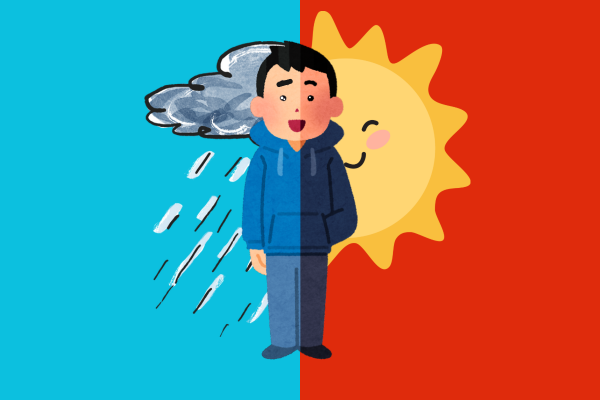“Bipolar Disorder” is the third of four articles in series on mental health awareness by Abbie Call. Read the next article on borderline personality disorder, OCD and Schizophrenia here.
Bipolar disorder is the fourth most common mental disorder.
It affects 2.8% of the United States population, or around one in thirty-six people. What are bipolar disorders? And what can you do for somebody you care for who struggles with bipolar disorder?
What Is Bipolar Disorder?
Emotions can be a complicated topic for anyone, but with mental health troubles, they tend to pop up in lots of ways they aren’t expected.
People with bipolar disorder often will not even be able to recognize emotional changes even though their family and friends do. They might be super productive for a week and then unexplainably sad and unmotivated for two weeks after that.
Bipolar disorder causes intense mood swings between feeling extremely up, and extremely down. These are called manic episodes and depressive episodes. Confusingly, people with bipolar disorder will also sometimes feel both at the same time. That is called a mixed episode.
There are three different kinds of bipolar disorder: bipolar I, bipolar II and cyclothymic disorder.
According to MedlinePlus, symptoms of bipolar disorder include both manic and depressive episodes:
Manic episodes:
- Feeling very up, high, or elated.
- Feeling jumpy or wired, more active than usual.
- Having a very short temper or seeming extremely irritable.
- Needing less sleep.
- Feeling like you are unusually important, talented, or powerful.
- Doing risky things that show poor judgment, such as eating and drinking too much, spending or giving away a lot of money, or having reckless sex.
Depressive episodes:
- Feeling very sad, hopeless, or worthless
- Feeling lonely or isolating yourself from others
- Having little energy
Other symptoms of depressive episodes are detailed in Depressive Disorders here.
Bipolar disorder should be diagnosed by a medical professional, usually through medical tests, a mental health evaluation, and a physical exam.
What Can You Do?
The fact can’t be stressed enough that when it comes to any mental disorder, listening intently to your loved one without trying to solve problems is so important. Of course, as a loved one, that’s not all you should do. You should make your own needs very clear and take time to take care of yourself as well.
It can be difficult to know what to do with someone who is bipolar when they are going through a period of depression or mania. Here are some ways to help before and in the event of an episode.
1. Stick to a Schedule.
Healthy routines can be helpful for anyone struggling with a mental disorder. Creating and sticking to a schedule for eating, sleeping, and exercise will support overall health in addition to treatment.
2. Notice Their Symptoms.
A lot of times people with bipolar disorder won’t know when they are being manic or depressive, but their loved ones will. Notice their symptoms, and know when it’s time to take them to the hospital to intervene.
3. Make a Plan.
Know what to do in the event of an emergency.
4. Be Patient and Accept Their Limits.
People with bipolar disorder can’t control their moods. And it may take a while for treatment to show results. Show them that you still love them, and know when to give them some time away.
Medication, therapy and healthy lifestyle changes can all be very important for someone struggling with bipolar disorder. Unfortunately, for various reasons people with bipolar disorders won’t go to the doctor for help. Loved ones can encourage someone who shows bipolar symptoms to get it checked out early before symptoms worsen.
– by Abbie Call
Feature image caption: Bipolar Disorder causes mood swings that the person with the disorder may or may not be aware of. But catching the disorder early and setting healthy habits can really help the prognosis. Courtesy of Abbie Call, The Byway.

Abbie Call – Cannonville/Kirksville, Missouri
Abbie Call is a journalist and editor at The Byway. She graduated in 2022 with a bachelor’s degree in editing and publishing from Brigham Young University. Her favorite topics to write about include anything local, Utah’s megadrought, and mental health and meaning in life. In her free time, she enjoys reading, hanging out with family, quilting and hiking.
Find Abbie on Threads @abbieb.call or contact her at abbiecall27@gmail.com.

